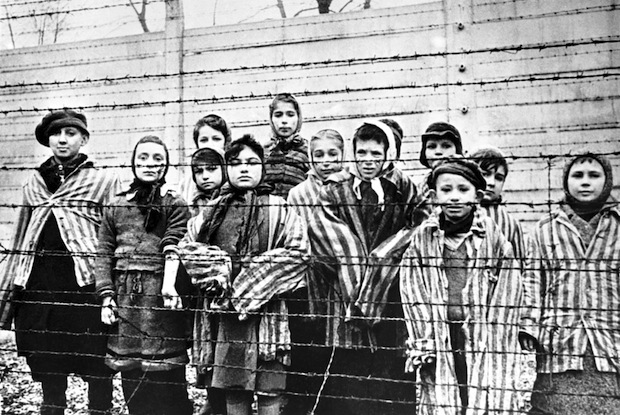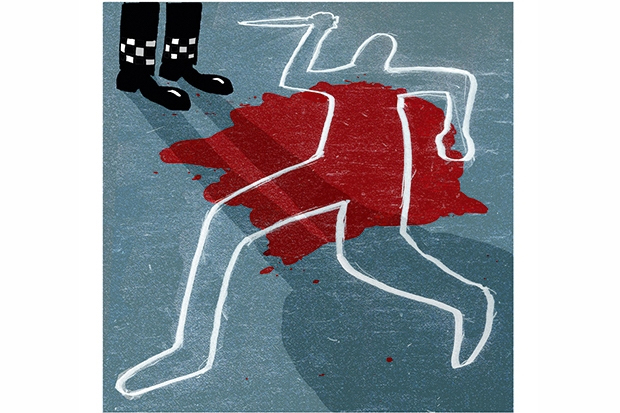My aim as a hospital visitor is to cheer, befriend, have a chat, do something to disrupt the bleak monotony of the modern hospital day. Some patients talk amiably while others are grumpy, demented patients kept on wards for months and who won’t shut up. Many conversations lead nowhere. Some days the pillow talk is dull, so I paid attention when someone in the chaplaincy mentioned a lady who’d been in Auschwitz and still had the camp tattoo.
I’d heard of Polish girls working in London cafés after the war showing numbers etched on their arms, but I’d never met anyone who had one. I taught English in Poland for a year and made friends with a student who came from the village of Oswiecim, which the Germans renamed Auschwitz. She first invited me to her home modestly telling me that the town was ‘famous for its ice-rink’. Her late father had been taken to the camp to work as a slave at the age of 16. On arrival a guard knocked his teeth out.
Another Polish friend had a grandfather who was murdered by the Nazis in Krakow jail, and his uncle, who also got the dental treatment on arrival in Auschwitz, had been hanged in the camp. I once lived in a flat where the lady upstairs told me her mother had died in Auschwitz aged 40. She showed me her photo. So I have known those who survived the survivors, but no one who could talk about being there.
Almost as soon as I reached her bedside, the tiny lady, now 91, showed me her arm. Her blue tattoo had blurred with time, so you couldn’t see the ‘AU’ for the camp, the P for Poland or the numbers, but she remembered them. I held her arm and stared at what looked like a barcode for some time. ‘You want my story,’ she said, and gave it. Her father, a doctor, had died before the war. When she was 19, she and her mother were sent to Auschwitz with other educated, middle-class Poles. Soviet POWs were the first inmates, systematically starved to death, followed by Poles; the Jews arrived in 1942.
‘We were upper-class,’ she explained with a self-deprecating smile. There were 150,000 non-Jewish Poles who went through the camp. Her brother, who was politically active, became a slave labourer in Germany.
‘You can’t imagine my life before the war,’ she said, sounding breathless. ‘I was going to become a doctor. We worked hard at our studies but we seemed to go dancing every night. Then I remember the Germans banging on our door.’
She imitated the gesture of this and I was eager to know what happened next; arrival in the camp, the dogs, the smell, the noise, the hunger. She was too feeble to describe anything vividly apart from a daily roll-call when a woman who was ill hid inside the barracks, but the Germans brought her out and stamped her to death. ‘Terrible, terrible,’ she said, trying impossibly to convey it. I felt nothing, no empathy, just a kind of flatness. I was barely able to focus on what she said.
I have read so many books about those events. There is some brilliant Holocaust literature, particularly by women; amazing tales of survival such as Magda Denes’s bitter memoir of her childhood in Budapest, and Ruth Altbeker Cypry’s story of how her mother kept a hacksaw down her stocking and eventually used it to saw through the bars of a cattle truck bound for Treblinka, and saved them both. Now, faced with someone who was actually there, I was skipping ahead as if the old lady in the bed was just another book. As she told me her mother had died in the camp, I was on the next page, looking for something I had not read about before, something new.
She mentioned the starvation and eating potato peelings. She’d survived by being sent to a munitions factory in Germany where she got more food. At some point she’d escaped, made her way back to Poland and joined the partisans. ‘I just wanted to kill,’ she told me. After the war she’d waited for her brother to return, but he’d died in Buchenwald. ‘That was when my life really ended,’ she said.
‘And what about your story?’ she asked suddenly, in a penetrating voice. I’m not supposed to speak about myself to the patients, and as she was deaf I didn’t fancy shouting out personal details. It should have been a conversation on equal terms to brighten a dull morning, but she was in the wrong context for that, and I had put her there. She looked disappointed. She’d given but got nothing.
She’d told me her story freely, almost thrown it at me, knowing that was what I wanted from her, and I shouldn’t have let her do it. She’d had a long life, which had not physically ended in 1945 — there was her marriage in England, her children, who she said did not visit her. Why hadn’t I dug about in that? We both knew that I wasn’t really interested in what came after. As I left her bedside, I felt like a thief rather than a friend.
Got something to add? Join the discussion and comment below.
Get 10 issues for just $10
Subscribe to The Spectator Australia today for the next 10 magazine issues, plus full online access, for just $10.
You might disagree with half of it, but you’ll enjoy reading all of it. Try your first month for free, then just $2 a week for the remainder of your first year.














Comments
Don't miss out
Join the conversation with other Spectator Australia readers. Subscribe to leave a comment.
SUBSCRIBEAlready a subscriber? Log in